The Ultimate Guide To RV Camping
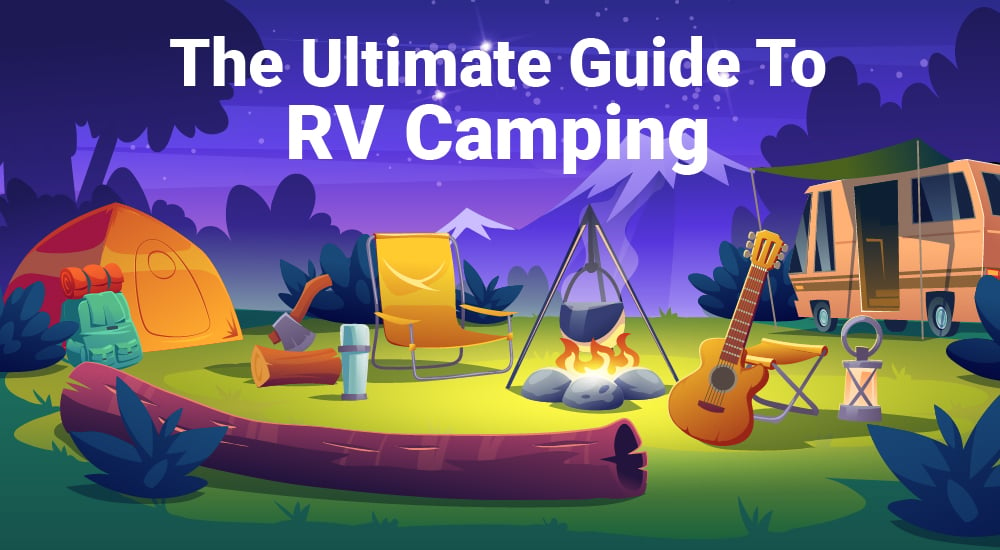
A complete guide on RV Camping; this will cover what you need to have an unforgettable experience. In 2018, 28 million people went on RV camping holiday. That year Americans spent 587.1 million days in their RVs. Early data shows that this number could be 68% higher in 2020. Perhaps even higher thanks to international travel bans in the US.
However, the pandemic isn’t completely to blame for this rise in camping numbers. In fact, the number of RV campers has grown year on year since 2013. And this is a trend that shows no sign of stopping.
So, while some of you reading this guide will be old hats at RV Camping, for many of you, this will be your first foray into the world of RVing. Welcome, you have so much joy ahead of you (and also lots of learning about how to legally dispose of ‘solid waste’, but we’ll get to that later).
There are a lot of things you need to consider before you embark on your first RV camping trip. For example, the first choice you will need to make is if you want to rent an RV or purchase your own. You’ll also need to decide where you want to travel. And you’ll also have to learn how to pack correctly for an RVing trip.
Thankfully, you have this handy guide that is going to help you prepare fully for your first (or next) RV camping trip. Before we tackle the ‘to buy or not to buy?’ question, let’s take a look at a few of the reasons you should consider going RV camping for your next getaway.
Why you should try RV Camping
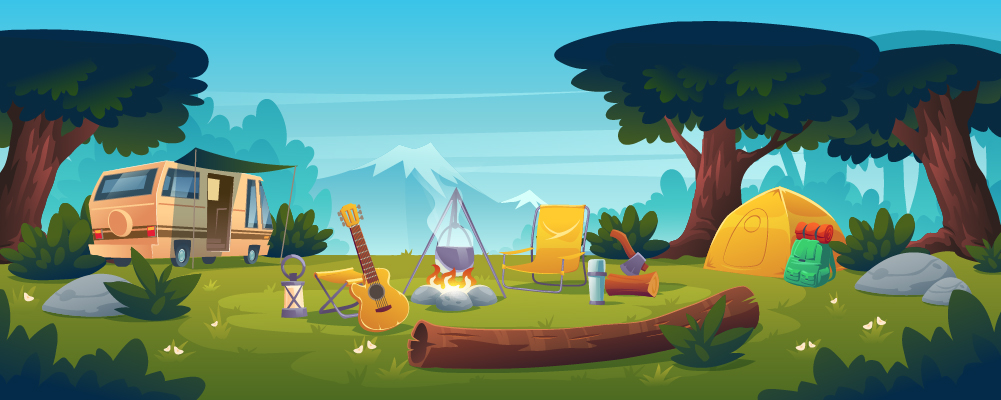
Statistically speaking many of you reading this guide will have never been on an RV trip before. Some of you have set your mind on going on one of these trips, and some of you still need a little convincing. If you fall into this last category then this next section is for you. Here are seven reasons why you should make your next trip an RV camping trip:
Cheaper than hotels

By 2028 the American tourism industry is expected to be worth over 2 trillion dollars. Why? Because Americans are forced to pay extraordinarily expensive nightly rates at hotels and our plane ticket prices are embarrassingly high.
The average visitor to America spends over $2000 on flights and hotel costs during their stay in the country. The average American spends over $200 per night on hotel rooms.
The prices are even higher inside cities and during peak holiday dates – some paying +$400 for motel rooms at peak season.
The average cost of an RV pitch is $45 (that rate is including water and electricity).
Some pitches are as low as $10 out of peak season, and the most expensive spots come in at around $80. We challenge you to find a $10 hotel room that comes with a fridge, double bed, TV, AC, heating, a working toilet and will let you bring your dog with you.
Budget-Friendly
Most Americans are taking holidays they cannot afford. According to LearnVest Money Habits and Confessions Survey, 74% of Americans have put themselves into debt to pay for a holiday. In fact, the average American spends over 10% of their annual income on vacations. Gen Z and Millennials are the main offenders here. But this trend is on the rise in all other generations as well.
Forbes theorizes that people are spending more money on their holidays because social media has created a societal expectation for us all to splash out on lavish holidays. When (a) most of us can’t afford to, and (b) spending that kind of money is not necessary to have a good time.
One of the true joys of RV camping trips that they are truly yours to customize. You can go where you want, spend what you want, pack what you want. Budgeting on an RV vacation is incredibly easy.
After flights, gas, and hotel rooms the two biggest vacation expenses are food and alcohol. Staying at a hotel or resort forces you to eat out for every meal. This can easily add up to at least $65 per person, per day. You are also forced to purchase alcohol from restaurants and bars. You’re also having to choose from a limited menu.
If you’re looking to save money on these two categories whilst on holiday, the RV gives you great opportunities to do that. You can prepare all your meals at home, in advance, and keep them in your fridge. Or you can cook on the go. Doing this can take your average food expenses per day from $60 per person to under $10 per person.
RV’s also give you ample space to store any supplies you need. Take advantage of this, head down to Costco and pick up a large crate (or a few bottles if you’re a hard-spirits kind of person) of your favorite alcoholic beverage, and store it in your RV. Why pay $6 for a beer at the bar when you can drink your favorite beverage at home for around $0.30 a can.
You’re always at home
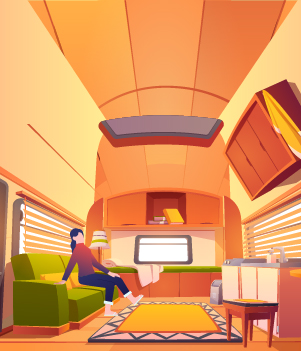
Speaking of keeping a few of your favorite things in your RV, why stop at beers?
One of our favorite things about RV camping trips is that you really don’t have to compromise on any of your home comforts.
If you want to bring your dog, you can. If the kids can’t sleep without their favorite blankets, you can bring them. You can bring your laptops. You can bring your pots and pans of choice.
The sky really is the limit when it comes to making your RV feel like home.
Why would you want to stay in a featureless hotel room, when you could stay in an RV full of your favorite things.
Total Flexibility
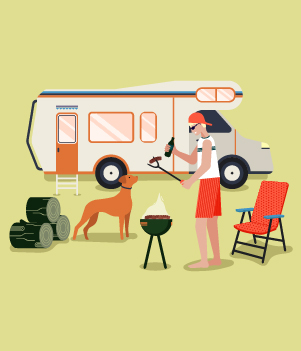
RV holidays are restricted by very little. You won’t have to take weird connection flights just to get a better deal. You don’t have to pay for the more expensive hotel, just because it’s closer to the airport. With RVing vacations, you have total flexibility.
For some people, this can be a terrifying idea. However, if you are someone who thrives when given a taste of freedom you’re going to love RVing. There are infinite different ways to have an RV holiday.
You could travel in or outside of the country. You could stay at the same campsite for the whole holiday, a different one every night, or you could completely avoid campsites for your whole trip.
You can spend a weekend on the road, you can spend six months on the road. You can travel any time of the year. The world really is your oyster when you are in an RV.
The perfect holidays for people with dietary restrictions
A member of our family is a celiac. She used to hate going on holiday. Why? Because she really struggled to find gluten free food abroad, she didn’t know any of the restaurants or bars, and most nights she would end up in bed having a reaction.
After one particularly bad holiday, we decided to try out RVing and that really was a game changer. Being able to cook for ourselves deduced the number of reactions she was having. Being able to travel with her favorite food and drinks meant that she was a lot more relaxed. By the end of the first day of this holiday, we knew we wouldn’t go back on any other type of trip.
Be in touch with nature
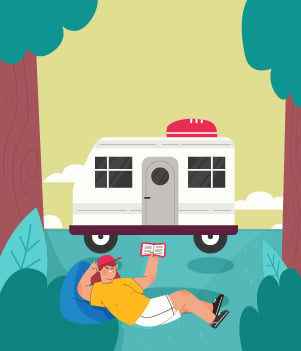
Nature is good for both our mental and physical health.
The research has proved this over and over again.
So much so that many Scandinavian countries recommend spending 5 hours a week in nature, on top of their exercise recommendations.
In these Scandinavian countries their average lifespan is nearly 5 years longer than over here in the US (78.4 vs 83.9).
So what are the benefits of spending time out in nature? Here are a few of the top reasons:
- Improves self esteem
- Lowers stress levels
- The air is clearer (improves lung function)
- Improves confidence
- Boosts mood
- A great form of exercise
- Great place for meditation and self reflection
Studies have shown that being in touch with nature allows you to come to terms with where we stand in the grand scheme of things. This experience helps a lot of people to put their stresses and worries into perspective. Humans have been going on pilgrimages into nature for as long as we have been able to walk.
Why not schedule in a time for some quiet reflection walk or hike during your trip. You’ll be thanking yourself afterward.
Try out the minimalist lifestyle
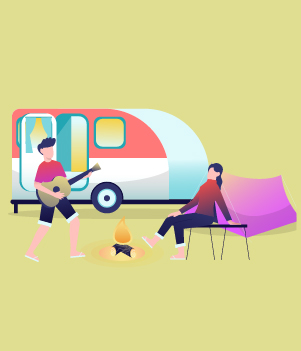
Ever wondered if you have what it takes to be a minimalist? Well, RVing can be a perfect way to find out the answer to that question.
As we have mentioned previously, RVing is what you make it and therefore it doesn’t have to be a minimalist pursuit. However, many people find spending time away from their material possessions very freeing.
Minimalism is another Scandinavian trick that we could all use a bit more of in our lives. Packing the bare necessities on your trip will help you to appreciate the small things more.
With less distraction, you’ll start noticing all sorts of daily wonders that you would have missed otherwise.
You’ll get to enjoy the beautiful views whilst on the road without distraction. You’ll get to enjoy natural events like the sunrise. You’ll even have more quality time to spend with the people you are traveling with.
If you’re curious about the minimalist lifestyle but don’t want to commit to throwing out all your stuff yet. RVing can offer you a great opportunity to try the lifestyle out for a weekend, a month, or even half a year.
Feel closer to your loved ones and (pets)
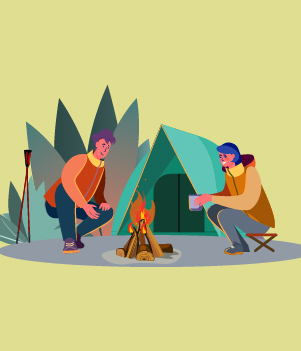
There really is nothing like spending time with the people you love. Particularly, when all of you have removed yourselves from the stresses of everyday life.
There is something so freeing about being in an RV, and being able to take your beloved family and pets with you just makes it all the more special.
Rather than being in a swanky hotel where you can all quickly get engrossed in your own things, you will be closer together physically, with fewer distractions of daily life around you.
This will enable you to spend some real quality time together, stripping things back and enjoying nature.
RV Skills You Need to Know – Rental
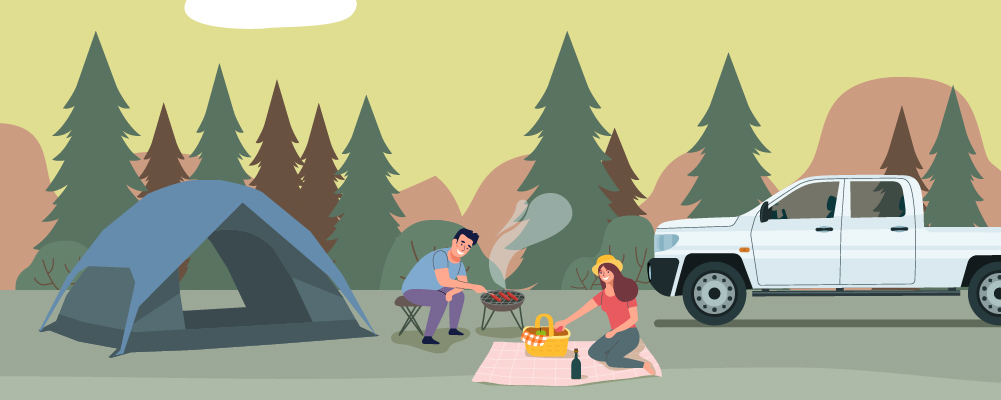
If you have never been on an RVing holiday yet (and haven’t been converted to all the wonders the world of RVs entails), then you might not want to commit to purchasing an RV straight away. For those of you who fall into this category then there is another option – you can rent an RV.
In this section we are going to talk you through everything you need to know to successfully rent an RV, and how to get yourself the best deal. We’re going to start by looking at how to find a reliable RV rental company.
Find the right rental company for your needs
There are two main forms of RV rental. Both have their benefits and their flaws. Let’s take a deep look at these forms of renting. The two main forms of RV rental we are going to be talking about today are renting from RV rental companies and renting from RV owners.
When you rent from an RV renting company you are basically paying a company that has a number of different RVs to borrow it for a specified amount of time. Cruise America is one of the biggest RV rental companies in America and has lots of resources in place to help newbie RV renters.
When you choose a rent from an RV owner you are renting someone’s personal RV that they may also use themselves. This is very common and done throughout America. However, you may have less protection if you rent this way than if you were to rent from a company.
That being said, it depends on the owner as they may have set up their own forms of protection. Your best bet is to thoroughly research and read reviews from other renters who have rented their RV.
Different Types Of Classes
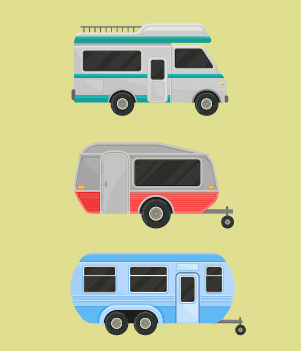
The name RV is actually a huge generalization and can be quite misleading if you have never had an RV or rented one before. Within the group of RVs, there are different classes.
Generally, the word RV conjures up images of huge motorhomes, but this is just one of the classes of RV. campervans, caravans, pop-up campers, and even five wheel trailers are included in the overall group known as RVs.
In this section of the article, we will be exploring these different classes in more detail. This will help you to gauge a better understanding of what type of RV would be best for you to rent.
Class A
These motorhomes are the biggest by far. Typically these are motorcoaches (imagine the sort of executive tour bus you’d imagine a rockstar having). They are more like buses than your typical campervan, and, as such, are very long! They can be around 30 feet and even up to 45 feet. They can act as a home and car in one and can sleep up to 6 people thanks to their astronomical size!
They exude luxury and often have some wonderful technology such as washers/dryers, cooking equipment, built-in fridges, and much more. Of course, all this luxury comes at a price, and they typically start at around $70,000.
However, we have known some high-class motor coaches to retail at over a million. Hey, if they are more luxurious than most apartments, that price is justifiable – they are basically mansions on wheels!
Class B
These are far less bulky than those in Class A. Class B motorhomes are a lot more compact and tend to be the most common of them all as they are ideal for solo campers and couples or small families.
They are built on a van chassis and so they have a much shorter length than motor coaches, coming in at around 25 feet. This means that they are nowhere near as spacious as motor coaches, but can still fit 2 people comfortably. 3 people may be more of a tight squeeze but certainly not impossible.
These types of motorhomes fall into two categories. You can either purchase a ready built RV at Class B, or you can convert an existing minivan or cargo van using a conversion kit.
This means that typically amenities need to be added to it to make it usable such as cooking equipment, cabinets, a bed, and toilets. That being said, many of them are not large enough for a toilet so do keep this in mind.
Prices can vary, with modern ready-made Class B RVs retailing at around $25,000 or more, and conversion kits being upwards of $35,000 (and that is without the vehicle!).
Class C
These types of RVs are a step up from Class B in the sense that they are often purpose built and have a more ‘classic RV’ feel. They tend to feature a cab-over design which is a distinct feature of RVs. they tend to be far smaller than that of a Class A, of course, but can often have some fantastic features like built–in showers and kitchens.
The amenities offered in Class C RVs and the more spacious design makes them popular with families and small groups of around 3 or 4 people. They vary in price depending on the size you choose, the age of the vehicle, and the amenities it includes. However, you can pick one up for as low as $50,000. The highest we see is around $120,000.
Rental Companies offer orientation on the Vehicle
Many rental companies allow you to ‘try before you buy’, or give you some form of training before you go ahead and take it away. This is to ensure that you will be totally comfortable when driving the RV, especially if you are trying it out for the first time.
Not only will you be taught how to operate the vehicle itself, but you will also be taught about the way the water, electricity, and gas systems work. These are very important aspects of RV camping that you need to know before you go.
The training and orientation given can also help to give you a feel of whether RV rentals are right for you and your family, allowing you a better understanding of what is involved. This will help you decide what sort of RV might be best suited to your needs.
If you break down – 24hrs service
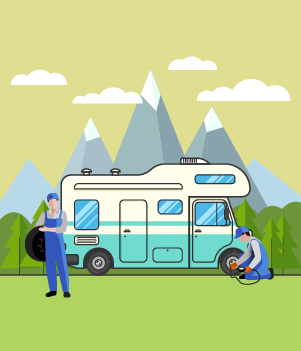
Another service that RV rentals can offer you is help if you break down.
The likelihood of a breakdown in a well-serviced rented vehicle is low, however, we all know that these things happen!
If you have your own RV you may not have good breakdown coverage set up.
However, it is a requirement by most RV rental companies that 24 hour breakdown services are offered to all customers.
This can put your and your family’s minds at ease that wherever you are, help will (hopefully) not be far away!
We always recommended checking the breakdown service operations in place with your chosen company before committing to your rented RV. Also, please bear in mind that renting from a private RV owner may not have the same reassurance. Check this with them before going ahead.
Check if there are areas that are off-limits
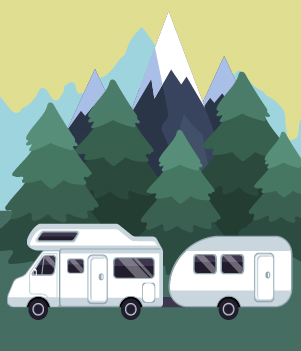
Some areas, whether in a National Park, RV campsite, or certain roads have restrictions and limits in places on RVs. This could be down to many reasons such as the size of the RV, the weight of the Rv, and even the age of the RV.
For example, certain bridges and roads may have weight restrictions that will make it impossible for bigger RVs to pass. There may be a road that goes under a low bridge and so tall RVs would be unable to pass.
Some RV campsites do not allow older RVs for safety reasons. As well as this, many National Parks and other beauty spots in America will not allow an RV inside as they do not want people camping there. Check all this before you grab your rental and take off on the roads.
It is a good idea to keep a note of where you can and can’t visit.
Buying your own RV
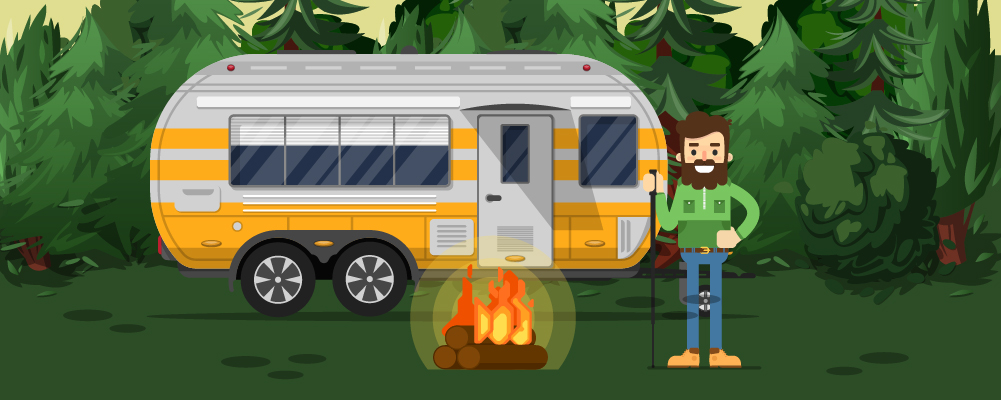
Buying your own RV is definitely something to consider if you have been a frequent renter of RVs for many years. In fact, it is thought that as many as 10 million households here in the US own an RV, and this figure is always rising. In this section of the article, we are going to be talking about some of the things that you should consider when you want to buy your very own RV.
What class to buy?
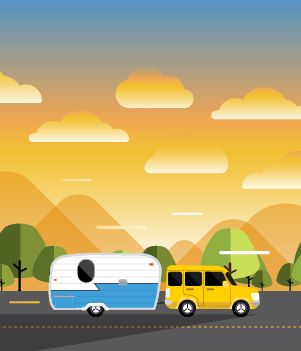
Much like when you are renting an RV, one of the first things that you need to consider is what class of RV you are going to buy.
The answer to this wholly depends on what you plan to use it for, how often you plan to use it, how long you will be staying in it each time, and how many people will be using it.
As you know from our exploration of the classes of RVs above, a Class A motorcoach is by far the biggest. Class B and C RVs are much smaller but will be far easier to navigate, park, and drive around.
In all honesty, there is no right or wrong answer.
If you are looking for a spot of luxury and plan to use your RV frequently, then a Class A motorhome would benefit you (provided you had the budget). If you plan to use your RV a few times a year or every weekend, then a smaller vehicle may suit you better, especially if you want it to be versatile and easy to get around.
How much budget do you have to spend?
It is no secret that buying an RV can be very expensive. However, if you have found that you are spending thousands and thousands each year on rental RVs, then this is likely to be a worthy investment for you.
Nonetheless, you should consider the budget that you can comfortably set aside for your RV and buy one accordingly. If you have nigh on half a million then sure, go for a class A RV (although, you can get them much lower than this, starting from around $70,000).
However, if you cannot fathom that amount of money then a more modest purchase would be better suited to you. Class B and Class C RVs can bring you the same sheer joy and still offer you all the basics you need from a camper at a much lower price.
What features do you want/need?

Think about what sort of amenities you need in your RV as an essential and then start to consider what you may like to have (non-essential).
Essential amenities may include a shower, kitchen and cooking facilities, a toilet, storage space, and a bed.
You can then think about optional extras.
For example, for some people, a toilet may not be all that essential as they will always be parked up at an RV camp where they can make use of bathroom facilities there.
For others, it may be essential that there is air conditioning or a refrigerator.
Write a list of the things you want and need before you start looking. This will make it easier when it comes to making a decision on what RV is best for you as you will have your desired features all down on one page.
Where do you plan on taking it?
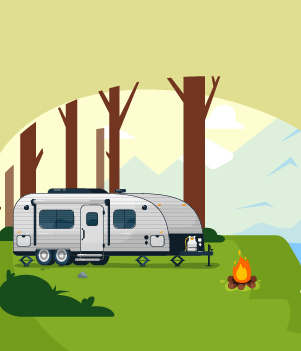
As we have mentioned several times, it is important that you consider where exactly you will be taking your RV. Think about what you want to do with it.
Do you want to go on long, America-wide road trips or will you be sticking to your local state and surrounding states? Will you be staying mainly at RV parks or will you also need to be prepared for some more rural camping?
These questions will directly influence the type of RV that you buy as they will dictate whether you need a smaller, easier to drive and navigate campervan, or a larger, luxurious motor coach with all the amenities you could ever need.
This will also tell you how old of an RV would be suited to you. For example, if you plan to use it in your local area rather than long road trips then an older second hand RV may be fine for you. However, if you plan to use it for your American road trip of your dreams then you may want to think about investing in as high quality as possible.
Extra expenses e.g. Insurance and fuel
Sadly, the cost of a motorhome does not just end when you buy your RV. you also need to consider the added extras that come with the purchase of any vehicle. You must have insurance for your vehicle that will cover it appropriately for any breakdowns.
Because you will be essentially living in it for sometimes weeks at a time, you may also want to consider getting insurance on any valuables that you travel with, as well as the equipment and appliances that you use in the RV.
Another consideration to make is the cost of breakdown cover. We explored this in detail earlier in the article when we looked at the benefits of a rental RV. However, you also need to ensure that your own personal RV has adequate breakdown cover.
Understandably, these vehicles can break down in the same way as your other vehicles might, and it is a good idea to have 24 hour breakdown service in place to ensure the safety of you and your loved ones.
Fuel is another expensive additional extra that can so often be overlooked when you are thinking about purchasing an RV. The tank in an RV is obviously much bigger than you may be used to in your everyday car. For this reason, it needs a lot more fuel in there to get to a full tank.
This translates to a lot of money. Now, imagine you are on a long road trip. You will likely need to refuel numerous times on a trip that lasts a week or more. This incurs a cost.
Where should you go RV Camping?
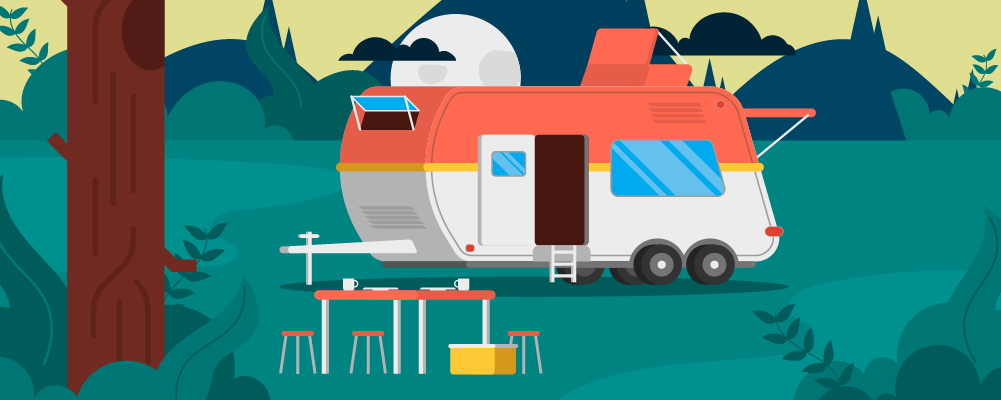
Deciding where to go on your RV camping trips can be exciting and daunting. In this section of the article, we are going to be exploring your options when it comes to choosing a place to take your RV.
RV Camps
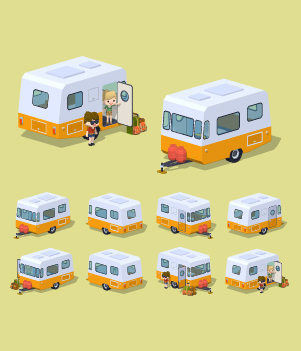
RV camps are one of the most popular destinations for all RV owners.
Not only do they act as a safe place for you to dock for the night when you are on a road trip, but they can also act as a base when you are traveling, or simply as a destination in its own right where you can meet other RV owners and socialize.
There are many RV camps around the world, with America having an impressive number.
You may be impressed to know that many of America’s most loved national parks have their very own RV camps set up so that you can explore the National Parks all day and come back to the RV camp at night.
One of these Parks is none other than Yellowstone National Park. there are several campsites within the huge expanse of Park for you to choose from. You could even make your way around all of them, exploring different areas of the park as you do!
One of the best resources for finding out about RV camps all over the States is KOA. You may have heard of these already if you have already experienced RV camping (or camping of any kind), but just in case you haven’t, KOA stands for Kampground of America and they are an organization that specializes in bringing people and nature together.
They have over 500 campgrounds all over America, many of which are suitable for RV camping. They own some of the Yellowstone sites, as well as sites in many other National Parks around the States.
The world is your oyster (to an extent)
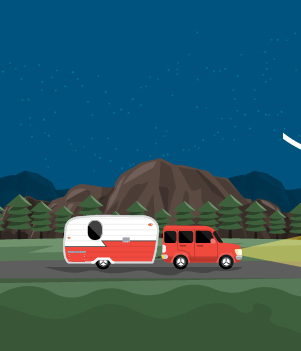
Don’t just feel like you have to be limited to RV camps for your RV holiday! RVs are so versatile that you can truly take them anywhere and just park up for the night in any destination you wish. Well, at least to a certain extent, anyway!
As we mentioned earlier in the article, there are some places like National Parks and other beauty spots that put in place their own rules and stipulations about RV use.
However, with some research, you can certainly find areas that will let you camp for the night without needing to go to a specified RV camp.
They may charge a fee, sure, but this way you get to do a little bit more exploring and will be able to be more versatile in your travel plans.
Essentials you need to go RV Camping
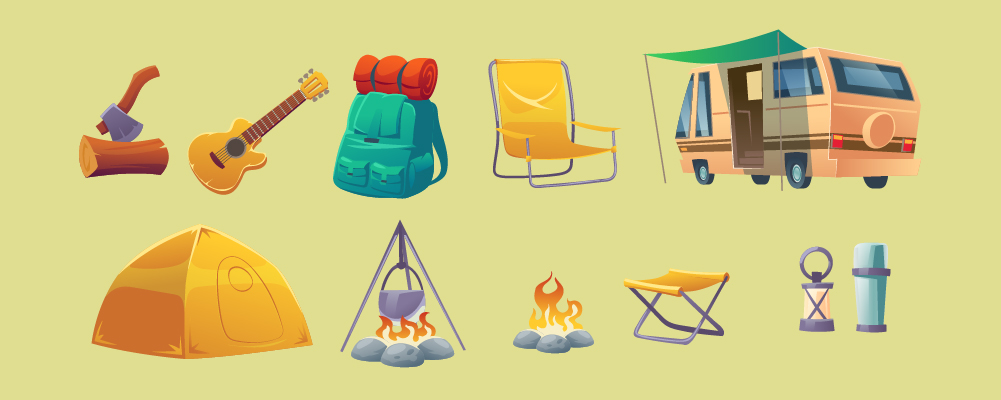
There are many essential items that you should be thinking about adding to your repertoire of RV camping equipment. As much as an RV is an upgrade from a tent, it is still not fully equipped with everything that you need, especially for longer trips.
For this reason, we felt we should tell you about some of the most essentials you will need to take with you. We have also provided you with a huge list of essentials that you should pack that you can print out and keep handy for each of your trips – that way you will never leave anything behind!
First Aid Kit
This goes without saying – it is essential that you bring along with you a complete first aid kit packed with plenty of bandages, plasters, antibacterial ointment, medicine for headaches, stomachaches, allergy tablets, and anything else that you think you might need.
Electrical Tape and Duct Tape
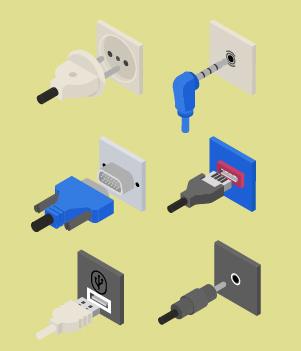
Electrical tape will prove beneficial for keeping together any electrical wires that you need to run your appliances. It can make them look neater and is also essential if you notice any damage.
You can use the electric tape to patch up damaged wires until you can repair them – very important when you’re on the road!
Having some good quality duct tape is also important as you can use it for any other repairs your RV may need whilst you are out on the road. We recommend getting a good quality waterproof one for maximum usefulness.
Large zip-close bag
Zip-close bags are fantastic for organizing anything and everything. You can use them for clothes storage, to keep your bedding in, and even as a way of keeping your dirty laundry together in one place until you can clean them.
Spare Batteries
Batteries have a knack of running out at the very moment you need them to be working. Ensure your flashlight doesn’t lose power in the middle of the night whilst you are dashing across the RV camp to the toilet. Keep spare batteries of all sizes aboard your RV – you will be glad you did!
Toilet chemicals

Of course, if your RV doesn’t have a toilet then you can just ignore this section.
However, if it does then this is vitally important.
Ensure you always carry toilet chemicals with you on your RV camping trips.
They are used to help breakdown waste and tissue so that your toilet drains easily and becomes less likely to blockages.
|
Here is our full list of RVing essentials: | ||
|---|---|---|
|
|
|
This list is not exhaustive, and we would be very interested in hearing about what other essentials you take on your trips!
Summary
RV holidays have grown in popularity over the last few years, and this trend shows no sign of slowing down.
This Post Has 0 Comments